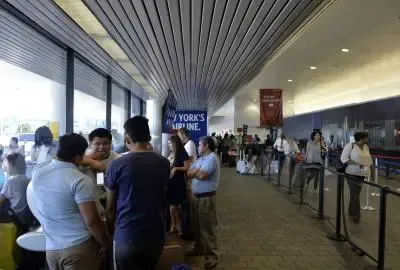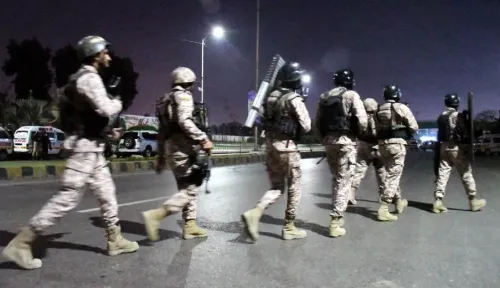What Are the Impacts of 2,000 Flights Being Cancelled as the US Government Shutdown Reaches Day 40?

Synopsis
Key Takeaways
- Over 2,000 flights have been cancelled due to the US government shutdown.
- The shutdown has entered its 40th day with no resolution in sight.
- The FAA has mandated a 10% capacity reduction at major airports.
- Staffing shortages are leading to increased overtime for air traffic controllers.
- Experts predict severe travel disruptions leading into the Thanksgiving holiday.
Washington, Nov 10 (NationPress) As the US federal government shutdown hits its 40th day, over 2,000 flights have been cancelled and more than 8,000 flights delayed across the nation, as reported by the flight monitoring platform FlightAware.
Since the Federal Aviation Administration's (FAA) implemented flight reduction strategy began on Friday, the number of cancelled flights spiked dramatically from 202 on Thursday to 1,025 on Friday, and then to 1,566 on Saturday, according to Xinhua news agency.
The number of air traffic controllers taking leave has escalated since the shutdown commenced on October 1, compelling many to work extended hours.
The US Department of Transportation and the FAA have recently declared a 10 percent reduction in capacity at 40 major airports nationwide starting Friday, aiming to alleviate staffing strains and enhance airspace safety.
“It’s only going to get worse,” stated Transportation Secretary Sean Duffy during a CNN interview on Sunday. “I anticipate that in the two weeks leading up to Thanksgiving, air travel will dwindle to a mere trickle.”
On the same occasion, National Economic Council Director Kevin Hassett remarked on CBS that if travel declines during Thanksgiving, “we could be staring down the barrel of a negative quarter for the fourth quarter.”
The regular budget, which should have been finalized by October 1, marks the commencement of the US fiscal year. Instead, it remains ensnared in political polarization. A temporary measure known as a 'continuing resolution' is currently necessary to fund the government.
This resolution is being delayed in the Senate due to a procedural tactic known as the filibuster, which hinders a legislative measure from being voted on.
It requires sixty votes to overcome it, rather than a simple majority, effectively slowing down any party with a majority from running rampant.
The Republicans, with only 53 votes, are unable to overcome the filibuster and advance their proposal for the temporary funding resolution.









